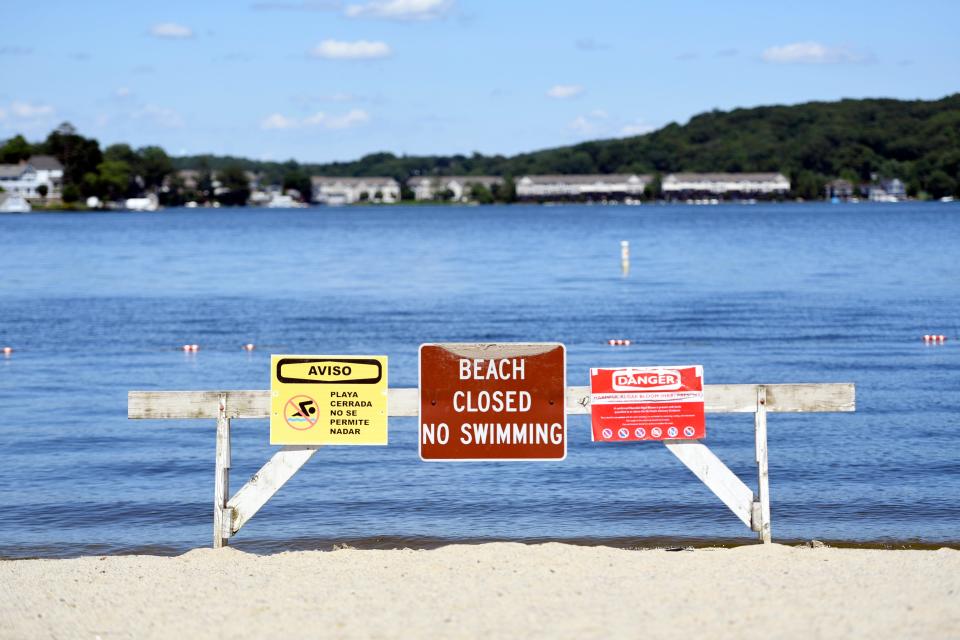Lake Hopatcong, Morris County get $1.75M to address toxic algae outbreaks
LAKE HOPATCONG — Communities serving New Jersey's largest lake will receive more than $1.75 million to combat harmful algae blooms, part of nearly $10 million in water quality improvement projects that the state will fund with federal COVID-19 relief money.
The Department of Environmental Protection last week announced the aid, which totals $9.95 million across 23 New Jersey entities. The Lake Hopatcong Commission received $1 million, one of the largest sums handed out, and Mount Arlington and the Morris County Park Commission will receive about $750,000 to help reduce pollution in the watershed that feeds the lake. The Greenwood Lake Commission also received a $1 million grant, and Florham Park got $177,000 for water quality projects.
"Funding for New Jersey’s public lakes is important for maintaining water quality and recreational opportunities for all residents," said Lake Hopatcong Commission Chairman Ron Smith. "The projects addressed under this funding will further our work to reduce occurrence of harmful algal blooms on Lake Hopatcong."
The money, from the American Rescue Plan Act of 2021, will fund work to improve water quality and reduce the effects of stormwater runoff on the state's public lakes.
The Lake Hopatcong grant will focus on reducing phosphorus levels to minimize the frequency and severity of harmful algal blooms, which in the past have forced shutdowns along the lake. Local officials will also remove sediment that has accumulated near stormwater pipes and outfalls that discharge into the water.
Earlier: Lake Hopatcong algae bloom triggers first health advisory of year as temperatures soar
The four municipalities bordering the lake — Jefferson, Roxbury, Hopatcong and Mount Arlington — will work together to install sleeves of biochar, a charcoal-like substance used to filter water and remove contaminants.
"This public lakes funding is an important step in caring for and protecting our state’s public waters," said Kyle Richter, executive director of the Lake Hopatcong Foundation. "We are excited to see these critical water quality improvement projects implemented, and we continue to advocate for permanent funding for New Jersey’s public lakes."
Both Lake Hopatcong and Greenwood Lake have felt the effects of severe algae blooms in recent years. Each has been forced to close multiple times due to high concentrations of cyanobacteria, the type of algae found in the blooms.
Cyanobacteria can cause numerous symptoms in humans if ingested, such as headaches, sore throat, abdominal pain, nausea, a dry cough, diarrhea and blistering around the mouth. A rash can occur when the skin comes in direct contact with the harmful algae.
Animals exposed to cyanobacteria can experience lethargy, stumbling and loss of appetite.

Other local agencies awarded money in the latest round of grants include the Lake Musconetcong Regional Planning Board and the Swartswood Lakes and Watershed Association.
"These grants will help a diverse group of DEP partners implement projects that will reduce the harmful effects of stormwater, nonpoint source pollution and harmful algal blooms that will only worsen due to the impacts of climate change," said state Environmental Commissioner Shawn LaTourette. "We are excited to facilitate these projects in various overburdened communities to meet department environmental justice and statewide water quality goals and objectives."
Kyle Morel is a local reporter covering Morris and Sussex counties.
Email: kmorel@njherald.com; Twitter: @KMorelNJH
This article originally appeared on New Jersey Herald: Lake Hopatcong awarded $1.75 million to address algae bloom problems

